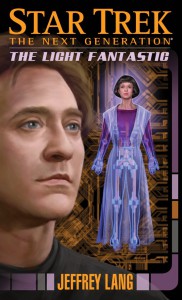
Star Trek: The Next Generation: The Light Fantastic by Jeffrey Lang

Although the plot sometimes felt a bit thin (especially the way it was resolved "off-screen"), the main themes of family, loss/grief, letting-go, growing (up) and continuing on etc and their various variations depending on the character's point of view resonated quite a lot with me. And it's really good to see Data again - as he is my favourite TNG-character. While I haven't condemned TPTB for their decision to kill him off in Nemesis, I haven't had any interest in TNG-books sans Data, Riker and Troi, either, as the remaining characters except for Picard don't interest (Geordi, Beverly) or even annoy (Worf!!) me. And the new ones... Might not be a popular opinion in certain circles, but I read tie-in lit (i.e. series based on the TV-series, not necessarily also the book-only series that are just set in this universe) because of the TV-characters, not because of original ones, so the latter ones really have to offer something beyond average, like Vaughn did for example. But I digress. Suffice it to say that I haven't read any TNG-book other than the 2 Mack-trilogies after Nemesis.
Data's whole focus is on Lal, in that way I guess he's not really that much different than other new fathers. Except, of course, for the fact that he has to deal with Rhea's death, with his father's, his own in a way and coming to terms with his new life. Much of what he has now is based on sacrifice, after all, and in a way Data has as much growing up and growing beyond the recent circumstances to do as Lal does. Only that Lal is way less weighed down by what has happened that made her resurrection possible, so she's just acting like a "normal" adolescent and child needing nap times, all in one.
And if Lal's suffering from Stockholm's syndrome, I was as well since Moriarty (and the countess) were essentially emprisoned with the key more or less thrown away, not caring too much if all systems remained operational. I realize back in "Ship in a Bottle" the solution was ingenious, but I guess, after watching the plight of the EMH, having Vic as another self-aware hologramm, it is also quite ruthless. And instead of criticizing everything Geordi should also have recognized his hand in the whole mess - after all, had it not been for him, Moriarty would never have existed in this way.
But then again, Geordi's presence wasn't really necessary, except that every Data/Sherlock needs his Watson when confronting Moriarty - and the most poignant moment was perhaps Geordi's realizing that while a Data might be back, that doesn't mean his is. As much as Data needs to figure out what to make out of his life, Geordi (and by extension the rest of the old TNG-crew) must come to terms with the knowledge that Data 2.0 can't replace the one they lost and that they need to form a new relationship.
The old Data thought small, his goal was to become more human, being a good officer but I can't really remember whether the fact that he's going to survive his mortal friends by centuries and more, ever seriously came up within the series. At the end of this novel Data is very much aware of that fact and because of that, even if he joins the Enterprise at one point (which will undoubtedly happen since I doubt a Data-only series of books is in the plans beyond the next 2 or 3 at most), he'll do so with a very much different outlook on things. And I really hope he'll also finds joy in the future because my overall impression of him was that of a driven man, a dedicated father but also of a sad and lonely person. Which fits with the thought that he's not really let himself grieve yet.
What I especially enjoyed:
* the countess' conversation with Lal and her regaining color - very poignant and moving scene
* grandpa Soong sending Lal off for a nap and the countess holding her hand
* Data's reaction to Kivas Fajo - fear, revulsion... what other traumas stemming from his earlier experiences will there be for Data? For me easily the best of the cameos.
* Shakti - brilliant scenes, bribing any- and everyone, creating shortcuts and workarounds etc - Data and her are a real dream-team
* the cameos
What I didn't like so much:
* as I said at the beginning, the plot felt rushed at the end.
* and that may seem strange, as I also cite them under the positive aspects: the cameos... there were so many at every twist and turn of the story that I gained the impression the story was built around the cameos instead of them helping flesh out the story. Doesn't help that I really hate Mudd.
* Alice's fate: returning her to a life of servitude was harsh and perhaps the one point in Data's actions that's really questionable... especially in the light of Data's own reaction to having to face the possibility of returning to Fajo.
Overall: A very entertaining and thought-provoking novel. More please! 8/10















